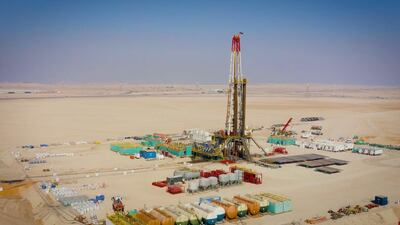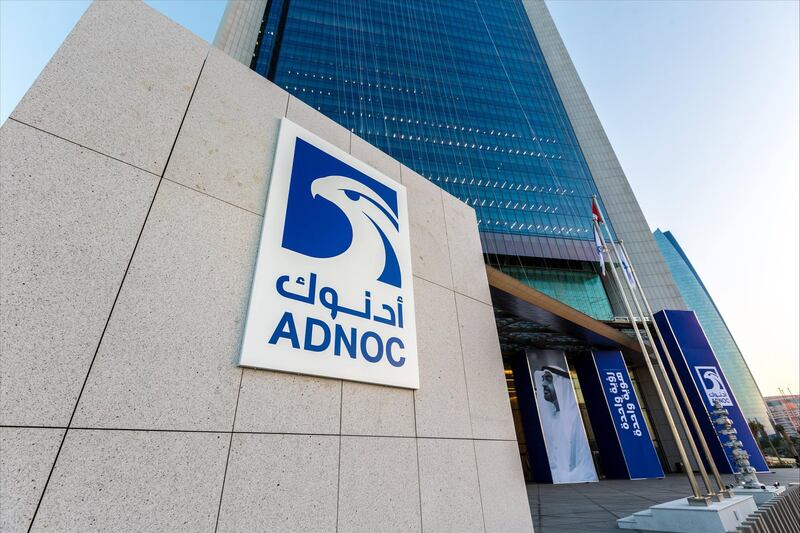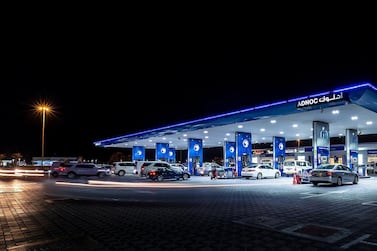Adnoc and French energy company Total delivered the first volumes of unconventional gas from the Ruwais Diyab concession that lies 200 kilometres to the west of Abu Dhabi city.
The delivery comes two years after development work commenced, the companies said on Wednesday.
The two partners aim to produce 1 billion cubic feet of gas from the concession before 2030, as part of the UAE’s strategy to reach gas self-sufficiency.
The Ruwais Diyab concession is a "stacked, high pressure, organic shale play with beneficially low sulphur volumes", a company spokesman told The National.
"The accelerated progress in Ruwais Diyab is a testament to the long standing partnership between Adnoc and Total, which has enabled us to expedite the learning curve in the production of unconventional gas resources, provided cost optimisation opportunities and driven efficiencies,” said Yaser Almazrouei, Adnoc's upstream executive director.
Abu Dhabi has begun to prioritise the development of gas from unconventional reserves, which are deposits that were earlier considered commercially unviable to exploit.
The UAE accounts for about 4 per cent of global oil production, with the bulk of the output from fields owned and managed by Adnoc.
Adnoc announced the discovery of additional reserves of 7bn "stock tank" barrels of oil, 58 trillion cf of conventional gas and 160tn cf of unconventional gas last November.
This pushed the UAE up the rankings in terms of hydrocarbon reserves, according to data from the US Energy Information Administration.
Earlier this year, the UAE also announced a discovery of 80tn cf of shallow gas reserves in an area between Abu Dhabi and Dubai – the biggest discovery in 15 years.
The delivery of the first volumes from the Ruwais Diyab asset follows "continuous efforts to de-risk unconventional gas resources across Abu Dhabi since 2016”, Adnoc said.
The gas extracted from the reserve will be delivered through a pipeline and a central early production plant in the Diyab field, which enables distribution through Adnoc’s gas network.

The concession, which is close to the Ruwais industrial area that is at the heart of Abu Dhabi’s refining and chemicals development, allows market access and helps advance the UAE’s “evolving unconventionals industry”, Adnoc said.
Total holds a 40 per cent stake in the concession, allowing it to explore, appraise and develop its resources further.
Adnoc has also partnered with other international oil companies to further explore its unconventional assets in the emirate.
The state-owned company awarded Russia’s Lukoil a 5 per cent stake in the ultra-sour gas Ghasha concession last year.
The Russian company is the fourth foreign partner to join the Ghasha concession, which also has Austria's OMV, Italy's Eni and Germany's Wintershall as stakeholders.
Adnoc is developing its gas caps such as Ghasha in a bid to boost its overall gas output to meet demand for power and industrial use.
The Ghasha project is expected to provide electricity to more than two million homes.
Much of the UAE's gas is trapped in unconventional, sulphurous caps, also known as sour gas, from which sulphur has to be stripped to make it suitable for consumption.
Separately on Wednesday, the company said it rolled out a virtual energy centre to provide the public with a detailed insight into its operations. The first-of-its-kind centre gives a first-hand explanation of how Adnoc is delivering on its 2030 strategy to create a more profitable upstream, more valuable downstream, and a more sustainable and economical gas supply.
The virtual centre is available to students, members of the public and anyone interested in learning more about Adnoc or the oil and gas industry, the company said.








